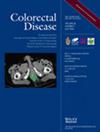Alcohol consumption and risk of early onset colorectal cancer: A systematic review and meta-analysis
Abstract
Aim
The existing evidence has shown a positive association between alcohol consumption and an increased risk of colorectal cancer (CRC). However, the evidence is primarily based on studies of CRC in all ages, and the role of alcohol in early onset colorectal cancer (EOCRC) remains to be determined. The aim of this study was to investigate an association between the increasing incidence of EOCRC and alcohol consumption.
Method
We systematically searched PubMed, EMBASE, Cochrane and Web of Science up to June 2024 for studies that evaluated the association of alcohol intake with EOCRC risk and report specific results (e.g. relative risk, OR or hazard ratio and corresponding 95% CI). Based on the varying designs of the included studies, the corresponding effect values were extracted and categorized into high alcohol consumption and low alcohol consumption groups; a random-effects model was adopted to estimate the pooled effect sizes for analysis. Furthermore, subgroup analyses and publication bias assessments were conducted.
Results
Three cohort studies and eight case–control studies were eligible and included. The results were pooled in meta-analyses, which yielded a heightened risk of EOCRC for increased alcohol intake (OR = 1.56, 95% CI 1.28–1.89, I2 = 89.3%). In the subgroup analysis, no significant differences were found in the association between alcohol consumption and the risk of developing EOCRC across gender, location or tumour site. The results of sensitivity analysis and publication bias indicated that the conclusion was robust.
Conclusions
This meta-analysis provides possible evidence for an association between alcohol consumption and risk of EOCRC. More research is needed in the future to confirm these findings.

 求助内容:
求助内容: 应助结果提醒方式:
应助结果提醒方式:


